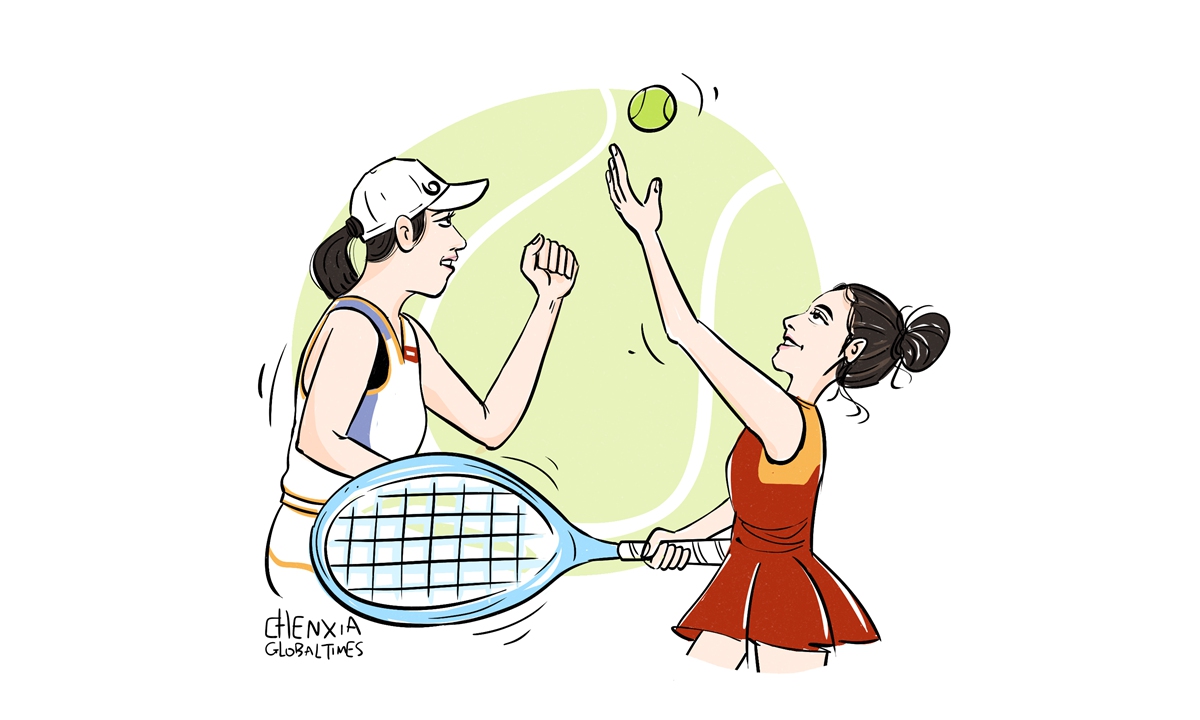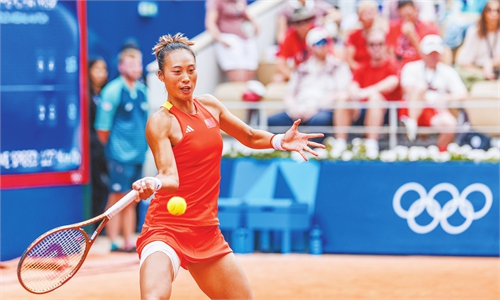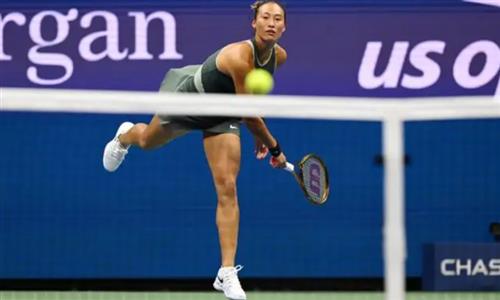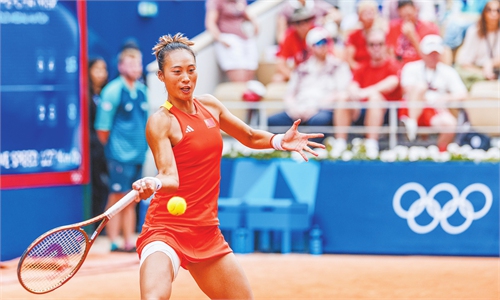ARTS / CULTURE & LEISURE
Tennis triumphs drive youth engagement

Illustration: Chen Xia/GT
China's Zhang Shuai and France's Kristina Mladenovic advanced to the US Open women's doubles final after a hard-fought 7-5, 4-6, 6-3 victory over Katerina Siniakova and Taylor Townsend on Wednesday.This marks Zhang's fourth appearance in a Grand Slam doubles final and her first US Open final since winning the doubles title with Samantha Stosur in 2021 in New York, the US. The pair will face the seventh seeds, Lyudmyla Kichenok and Jelena Ostapenko, in the final on Friday.
Meanwhile, Zheng Qinwen concluded this year's Grand Slam journey with a US Open quarterfinal defeat to Aryna Sabalenka. Despite the loss, her deep runs to the major tournaments and historic triumph at the Paris Olympic Games this year have attracted widespread attention and sparked interest in tennis across China.
The success of Chinese players in international tennis tournaments has fueled a renewed wave of enthusiasm across the country. In return, the expanding tennis demographic is contributing to the emergence of young talents who are striving to make their mark on the global stage.
The 21-year-old Zheng made history in Paris to become the first Asian-born player to win gold in a tennis singles event at the Olympics. She also achieved a runner-up finish at this year's Australian Open in January, making her the second Chinese player in history to reach a major final since Li Na won the Australian Open in 2014.
At Paris Olympics, Chinese duo Zhang Zhizhen and Wang Xinyu claimed silver in the mixed doubles. The fact that they were only paired right before the mixed doubles event began due to the last-minute withdrawal of Zhang's original partner Zheng added gloss to their laurels.
Zheng's success follows in the footsteps of earlier Chinese tennis icons like Li, and her achievements have contributed to the increasing participation in tennis across the country. China continues to build a strong presence in global tennis, with more grassroots initiatives and investments in tennis infrastructure, making the sport more accessible to young players across various regions.
"She put a little seed in my heart that I also wanted to do that and to be like her... and even better," Zheng said during a Tennis Channel interview in 2023 about Li's 2011 Roland Garros victory.
According to the 2021 International Tennis Federation Global Tennis Report, China ranked second globally in tennis participation, with 19.92 million people involved in the sport, representing 22.9 percent of the world's tennis population. This positions China just behind the US.
The report also highlights China's strong tennis infrastructure, with 49,767 tennis courts, the second-highest number in the world. These figures show the rapid growth and popularization of tennis in China, transitioning from a niche activity to a widely enjoyed sport.
In Zheng's hometown, Central China's Hubei Province, tennis training has been included in the city's youth sports summer camps since 2015. The number of children who have participated in free tennis training increased from 1,000 in 2015 to 2,600 in 2023. Over 100 primary schools in Wuhan now offer tennis programs, which has greatly boosted youth participation in the sport, according to Changjiang Daily.
Hubei's Jingshan city, known as "China's Tennis Hometown," has cultivated a strong tennis culture. About 80,000 residents, or 12 percent of its population, regularly play tennis. The small city's 286 tennis courts ensure that residents can reach one within a 15-minute walk from anywhere in the urban area. Jingshan also holds regular grassroots tennis events, including the China (Jingshan) Tennis Festival, making it a national model for tennis promotion.
Aiming to secure enough ranking points to qualify for the WTA Finals in November, Zheng is set to make her debut at the China Open scheduled from September 23 to October 6 in Beijing.
This year's tournament featured the largest number of Chinese players ever to compete in the singles, reflecting the country's rapid rise in the global tennis scene.
The increasing participation reflects both the expansion of tennis culture and government efforts to promote the sport. The growth is attributed not only to the success of Chinese tennis players but also to the expansion of tennis facilities and grassroots initiatives. The development of tennis infrastructure has made the sport more accessible to people across China.
Similar to how Li inspired Zheng, Zheng's victorious journey may have planted seeds in the hearts of many more children.
The author is a reporter with the Global Times. life@globaltimes.com.cn



